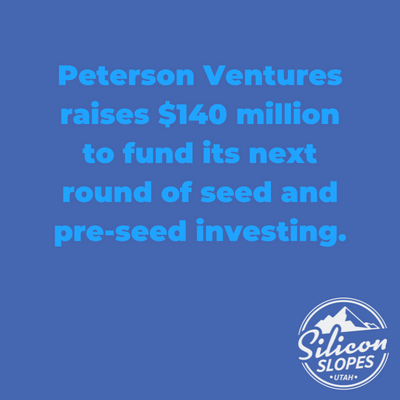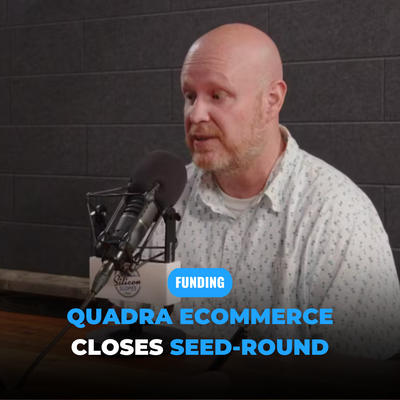At the start of its second decade, Peterson Ventures has now closed its largest fundraising round ever at $140MM
Salt Lake City-based Peterson Ventures announced this morning that it has raised $140 million in new capital, with $115 million assigned to its Fund IV and the balance of $25 million allocated to its new Opportunity Fund I.
With this latest fundraise, Peterson Ventures now has over $550 million in assets under management (AUM) since its founding in 2012.

As with the approach of its previous funds, Peterson Ventures’ Fund IV will focus on deploying up to $2.5 million investments in seed and pre-seed investments across Software-as-a-Service and digital commerce brands, with nearly 100 investments made by the firm during its inaugural decade.
Conversely, the new Opportunity Fund I is designed to allow Peterson Ventures to participate in follow-on funding rounds with its portfolio companies.
Peterson Ventures is the 10-year-old venture arm of the Peterson Partners platform.
Founded by Joel Peterson, Peterson Partners is an independent investment management firm with over $1.8B assets under management.
Peterson Ventures: One of Three Segments within Peterson Partners
Two Peterson Ventures executives—Ben Capell, managing director and co-founder, and Taylor Jones, principal—joined me in-studio recently to discuss this new funding, the investing paradigm of Peterson Ventures, and the philosophy their firm has taken to help it identify the best companies to invest in.
“Within Peterson Partners, we've got three different strategies,” Capell said. “We've got Peterson Private Equity; the private equity firm at Peterson has historically been what Peterson has been known for. So (it’s) been around since 1995 and started raising outside capital in early 2000. (And it’s currently investing out of its ninth fund.)
“Then we have Peterson Search, which historically has been a strategy sometimes known as entrepreneurship through acquisition, where you'll find either a solo or a partnership to go out and find a business to acquire. Once they find that business, they step into the management role and run the company.
“And then Peterson Ventures, (which is) where Taylor and I spend all of our time. We started Peterson Ventures really in 2012 when we raised our first fund of outside capital, … (and we’ve) invested in just under a hundred businesses on the venture side since (then).”
Capell explained that Jones is one of two former portfolio executives Peterson Ventures has brought onboard as a partner, the other being Ilana Stern.

Part of the mindset at Peterson Ventures is what Capell described as “founder empathy.”
“A lot of our ethos is thinking through what it was like in those early days when you're trying to do a really hard thing. So it's a lot of how we think about working with founders. I think it is really important for us to have that (founder empathy) as part of our DNA.”
The Roles of Prior Success, Team-Building, Problem-Solving, and Storytelling in Investable Entrepreneurs
As we dug into our conversation, Capell identified four strengths that Peterson Ventures looks for in entrepreneurs that they consider as potential portfolio companies, specifically
- A history of prior success, professionally and/or personally,
- The ability to build the right team,
- A strength in both problem identification and problem solving, and last but not least,
- Being a strong enough storyteller to convince others to join this entrepreneurial journey, both employees/partners and customers.
Case in point, on the prior success prospective, Capell said:
“The way I think about it is we have an interesting purview because we at Peterson Partners are investing across a lot of different stages,” Capell explained. “And so it is always about the team. I think we talk about that a lot across the entire platform. That said, the earlier you go in the lifecycle of a business, the more important the individuals are.
“We have a bit of a rubric that we think about. I think the first thing that we think about is is there a demonstrated pattern of success? We don't think success comes by accident. And so it's why we're all interested in backing founders who have had success and are looking to start another company.”
Jones went on to emphasize that storytelling is “a great skill to have” as an entrepreneur.
“To Ben's point, it's really a vulnerable time as a seed stage founder. You need to present a level of confidence and share a vision that investors will want to back you, that great talent will leave stable positions.
“I was just on a conversation with a terrific person who's thinking about leaving a great company to come join one of our startups. And as a founder, you need to help them see the upside, to see the vision, to see the potential of leaving something really stable. That takes a certain amount of storytelling, of persuasion, to do that. And I think that's part of the mix of attributes that we're looking for to back a founding team.”
Greater Industry Specificity for Targeted Portfolio Companies
Jones went on to break down the focus of Peterson Ventures into two broad categories: business-to-business Software-as-a-Service (B2B SaaS) firms and digital commerce brands.
On the digital commerce side of the equation, it’s why Peterson Ventures invested in Bonobos (acquired by Walmart in 2017 for $310 million) and Allbirds, which hit a valuation of $4 billion on the first day of trading on the NASDAQ Stock Market when the firm went public last November.
Conversely, some of the more notable B2B SaaS firms Peterson Ventures has placed bets on include
- Artemis Health (acquired by Nomi Health for $200 million in January 2022),
- HireVue (majority ownership acquired by Carlyle Group in 2019),
- Lucid (hit triple unicorn status a year ago when it raised $500 million), and
- Nomi Health (closed a $110 million series A funding round in December 2021),
just to name a few.
AUTHOR’S NOTE
What hit me during my visit with Ben and Taylor was the juxtaposition between the reality of being a startup founder versus this fairly recent, media-fueled love affair with entrepreneurship, as if it were some newfangled thing, something that now everyone can do.
Yet, in reality, entrepreneurship has been around for centuries, even if the word wasn’t coined until the late 1800s.
In fact, I believe that entrepreneurism was virtually baked into the American experiment some 400 years ago with the arrival of the Mayflower at Plymouth Rock, with many of the earliest settlers learning that once subsistence was solved, getting ahead via hard work, ingenuity, and stick-to-itiveness was definitely doable.
So I found it really refreshing, and informative, to get the Peterson Ventures perspective on the role of founders/entrepreneurs in the companies they choose to back.
And as Ben explained, “It always comes down to the team.”
To watch the full interview of Peterson Ventures’ Ben Capell and Taylor Jones, please click here to watch this episode of “Conversations” on SiliconSlopes.tv. Conversely, you can also listen to this interview on your favorite podcast provider at “Silicon Slopes Conversations” via most popular podcast platforms;” case in point, via this link on Apple podcasts.
Thank you.








